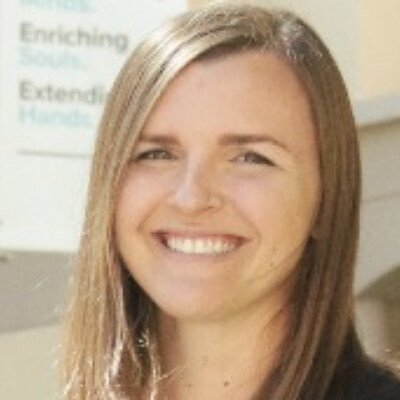The use of telehealth has significantly increased from pre-pandemic times. With the increasing use of virtual platforms in healthcare, it is essential for healthcare professionals to develop strong telehealth and interprofessional collaboration skills. Whole person care requires a comprehensive approach to patient care, which must address the physical, mental, and spiritual needs in a coordinated effort across various disciplines. Therefore, there is a need to train health professional students together in telehealth skills to prepare them to deliver virtual interprofessional care. This presentation highlights how interprofessional education is strengthened when disciplines such as graduate counseling and chaplaincy are uniquely integrated with graduate nursing and pharmacy to provide virtual services. Through an interactive telehealth simulation featuring a live standardized patient presenting with depression, students from these four disciplines engage in collaborative teamwork and shared clinical decision-making to deliver holistic care. Students all worked together to provide physical, mental, and spiritual assessments as well as develop an integrated care plan to ensure best outcomes for patients with complex health needs. During the debrief, students reflected on how to improve the care of patients and grow in telehealth and interprofessional collaboration competencies. Quantitative feedback obtained from validated tools including the Telehealth Competency Questionnaire- Provider (TCQ-P) and revised Interprofessional Competency Attainment Survey (ICCAS-R).
This presentation aligns with conference theme six. It highlights an innovative approach to preparing learners for collaborative practice when performing virtual care. While chaplaincy programs are often underrepresented in interprofessional education (IPE), they play a vital role in supporting patients' overall health. This unique telehealth curriculum integrates physical, mental, and spiritual care in an interprofessional setting, enabling learners to engage with diverse disciplines and grow their understanding of each team member’s role in delivering whole person care.
Attendees will learn about the design and planning process, the outcomes, and the impact on interprofessional competency for students. In addition, attendees will gain practical insights, adaptable tools and strategies, and key lessons learned to support successful development of a telehealth simulation incorporating physical, spiritual, and mental care in educational settings.
This presentation is in alignment with conference priorities of faculty and student collaboration, with the project being led by a Doctor of Nursing Practice (DNP) student. The student designed the simulation experience to include telehealth, and the patient scenario involved an uninsured patient from a rural area. Outcomes were measured pre- and post-surveys utilizing TCQ-P and ICCAS-R which assessed telehealth and interprofessional competencies.
In support of improving patient care, this activity is planned and implemented by The National Center for Interprofessional Practice and Education Office of Interprofessional Continuing Professional Development (National Center OICPD). The National Center OICPD is accredited by the Accreditation Council for Continuing Medical Education (ACCME), the Accreditation Council for Pharmacy Education (ACPE), and the American Nurses Credentialing Center (ANCC) to provide continuing education for the healthcare team.
As a Jointly Accredited Provider, the National Center is approved to offer social work continuing education by the Association of Social Work Boards (ASWB) Approved Continuing Education (ACE) program. Organizations, not individual courses, are approved under this program. State and provincial regulatory boards have the final authority to determine whether an individual course may be accepted for continuing education credit. The National Center maintains responsibility for this course. Social workers completing this course receive continuing education credits.
The National Center OICPD (JA#: 4008105) is approved by the Board of Certification, Inc. to provide continuing education to Athletic Trainers (ATs).
This activity was planned by and for the healthcare team, and learners will receive Interprofessional Continuing Education (IPCE) credit for learning and change.


Physicians: The National Center for Interprofessional Practice and Education designates this live activity for AMA PRA Category 1 Credits™. Physicians should only claim credit commensurate with their participation.
Physician Assistants: The American Academy of Physician Assistants (AAPA) accepts credit from organizations accredited by the ACCME.
Nurses: Participants will be awarded contact hours of credit for attendance at this workshop.
Nurse Practitioners: The American Academy of Nurse Practitioners Certification Program (AANPCP) accepts credit from organizations accredited by the ACCME and ANCC.
Pharmacists and Pharmacy Technicians: This activity is approved for contact hours.
Athletic Trainers: This program is eligible for Category A hours/CEUs. ATs should claim only those hours actually spent in the educational program.
Social Workers: As a Jointly Accredited Organization, the National Center is approved to offer social work continuing education by the Association of Social Work Boards (ASWB) Approved Continuing Education (ACE) program. Organizations, not individual courses, are approved under this program. State and provincial regulatory boards have the final authority to determine whether an individual course may be accepted for continuing education credit. The National Center maintains responsibility for this course. Social workers completing this course receive continuing education credits.
IPCE: This activity was planned by and for the healthcare team, and learners will receive Interprofessional Continuing Education (IPCE) credits for learning and change.
Learners can claim CE credit by completing the Daily Evaluation.




